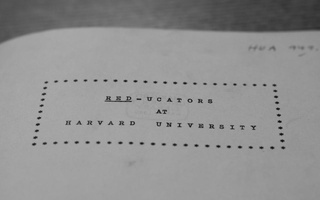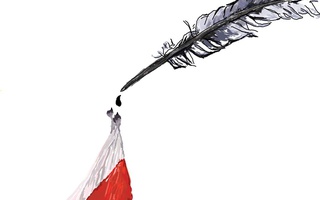Since September, tens of thousands of pro-democracy protesters have taken to the streets of Hong Kong. The protesters argue that the Chinese Communist Party has broken its legal obligation to hold free elections for the city’s Chief Executive. Beijing’s election proposal would limit candidates to a select few vetted by a committee loyal to the central government, while the protestors clamor for open nominations.
Seen from the narrow confines of “Homo Economicus,” Hong Kongers’ dissatisfaction with the status quo is puzzling. On a per-capita basis, Hong Kong is one of the world’s richest economies; its residents enjoy some of the best health care outcomes in the developed world. The conservative Heritage Foundation’s 2014 Index of Economic Freedom even ranked Hong Kong first—eleven spots ahead of the United States.
Yet tens of thousands of well-to-do Hong Kongers, armed only with umbrellas, have braved tear gas and police batons in the fight for political reform. Economists can no longer afford to ignore the important role of politics in shaping people’s sense of well-being.
Daron Acemoglu, of MIT, and James Robinson, of Harvard, have long argued for the economic relevance of political institutions. Under their theory, inclusive institutions—which include freedom of the press, religion, as well as one person, one vote—promote economic growth by encouraging innovation. By contrast, extractive institutions—among them authoritarian rule—suffocate development.
Of course, the rapid growth of authoritarian China since 1979 would seem to give the lie to this theory. But Acemoglu and Robinson argue that long-run growth under an extractive regime like China’s is unsustainable. For a while, the political elite may benefit from faster growth and may even work to foster it, as they have in China. But as soon as innovation threatens the elite’s monopoly on political and economic power, the elite clamp down and growth halts.
So what does this have to do with Hong Kong?
The answer is twofold. The first possibility is that Acemoglu and Robinson are wrong, and long-term economic growth can continue under China’s authoritarian regime. If so, in several decades China’s cities could look a lot like Hong Kong. But Hong Kong’s Umbrella Revolution suggests that people may want more inclusive institutions even when their basic economic needs are fulfilled. This scenario must worry the Chinese Communist Party.
The second and more likely possibility is that Acemoglu and Robinson are right, and China’s growth will eventually stall. The Chinese Communist Party has an urgent need to maintain high growth: each year, millions of workers move from rural areas to urban centers looking for work. Should growth slow and jobs become scarce, popular support for political and social reform could grow.
Hong Kong’s Umbrella Revolution is the highest-profile defiance of Communist Party authority since Tiananmen Square (unlike the 2008-9 unrest in Xinjiang and Tibet, these protests strike at the very heart of China’s economic system). Despite the best efforts of Chinese censors, news of the protests have spilled over to the mainland through social media. Even if the Hong Kong protests are unsuccessful at achieving their goals, they could provide a potent example for disgruntled mainlanders. This scenario must also worry the Chinese Communist Party.
Indeed, Beijing’s recent policies may be an implicit endorsement of Acemoglu and Robinson’s theory. President Xi Jinping has attacked corruption and liberalized state-owned enterprises in an attempt to increase economic inclusivity. But these reforms have been exclusively top-down, and have not loosened the Communist Party’s monopolistic grip on political authority. If Acemoglu and Robinson are right, this reluctance to truly reform China’s institutions may mean an end to China’s growth miracle.
Political power can grow from the barrel of a gun, but economic prosperity may prove a little harder to cultivate.
Oliver W. Kim ’16, a Crimson editorial writer, is an economics concentrator living in Leverett House.
Read more in Opinion
It's the Thought that CountsRecommended Articles
-
And the Wall Came Tumblin’ DownAs we celebrate the anniversary of the fall of communism in Central Europe, we should remember that not every country behind the Iron Curtain followed the path of those that have successfully entered the fold of Western Europe.
-
POSTCARD: Reflections MandatoryIn a province that most people would never be able to point out on a map, eight of us Harvard juniors sit quietly, draped over a separate piece of rosewood furniture in the hotel room.
-
Mr. Bowman, Tear Down this WallOn the fateful day of the Harvard-Yale football game, most would expect to see Undergraduate Council President Johnny F. Bowman ...
-
 FM Investigates: The Kremlin on the Charles
FM Investigates: The Kremlin on the Charles -
 Even When No One is Looking
Even When No One is Looking -
 New Accusations of Communism at Harvard
New Accusations of Communism at Harvard













